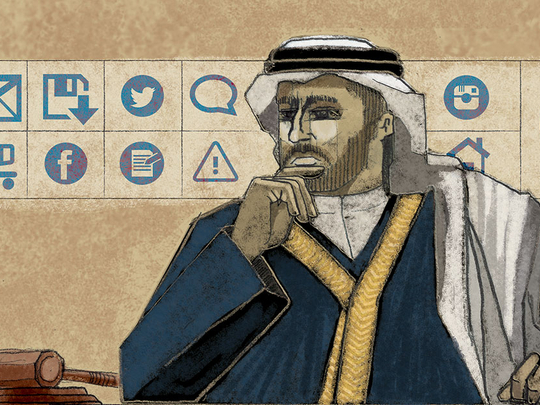
Dubai: Any form of misuse of a computer/smart device or an electronic network/system could fetch the violator, if found guilty, a lengthy jail term and/or a fine as hefty as Dh3 million.
The UAE Cybercrime Law No 5 of 2012, issued by President His Highness Shaikh Khalifa Bin Zayed Al Nahyan in 2012, includes stern punishments that could go up to a life sentence and/or a fine varying between Dh50,000 and Dh3 million depending the severity and seriousness of the cybercrime.
Commenting on the cybercrime law and its effectiveness to combat cybercriminals, Showq Al Katheri, of Al Katheri Advocates and Legal Consultants, told Gulf News: “In this new era, we have vast interacting forums in the form of social media such as Facebook, Twitter, WhatsApp and others. Besides increased socialisation, [this] has resulted in harmful effects and generated crimes like fraud, cheating and other crimes of a similar nature.”
To control these unethical acts, the UAE issued Federal Decree No 5 of 2012 [cybercrime law] to discourage the misuse of social media, according to Showq. Everyone, she says, is aware of the fact that the internet is a global facility and it does not have any boundaries.
She categorises cyber criminals into three categories:
1) Minor hackers, who hack other’s accounts for fun.
2) Criminals who use their excellent knowledge of the cyber world and its methodology only for financial gains.
3) Malevolent individuals who seek revenge on someone in the cyber world.
“As per the cybercrime law, whoever uses a computer network and/or electronic information system (social media) for the invasion of privacy of another person in other than the cases allowed by the law and by recording of audio or video conversation or communication, photographing others or copying the same photographs and publishing news, statements or information, even if it’s true, he/she shall be punished by imprisonment of a period of at least six months and a fine not less than Dh1,50,000 and not exceeding Dh500,000 or either one of these two penalties,” said Showq.
“Now that the law has termed all kinds of misuse of social media as a criminal offence, including threatening, impersonation, solicitation, we should appreciate and highlight the Dubai Police’s efforts where they proved that they are strong enough to reach the persons who commit the cybercrimes regardless of their experience and have built a very strong division for such crimes,” she added.
Families should keep an eye on their children to prevent them from being exploited on the internet by a third party and should explain to them the risks of misusing social media, she advised.
“Meanwhile, I approach all the civil society organisations to play a vital role in generating awareness on all types of cybercrimes through seminars, speeches and brochures,” Showq said.
Advocate Yousuf Al Bahar, of Al Bahar and Associates, says cybercrime happens when “technology becomes a criminal instrument”.
“Cybercrimes may be defined as the crimes which may be committed against individuals or groups with a criminal intention to intentionally smear the reputation or corporeally or incorporeally harm the victim, directly or indirectly, through the modern communication networks such as the social media networks, internet (chat rooms, instant messaging and emails) and mobile phones (SMS and MMS),” he said.
Cybercrimes include any criminal act committed through computers or smart devices or networks, according to Al Bahar, such as the hacking and piracy and the traditional forms of online crimes.
“Such crimes may threaten the country’s security and its financial safety. This kind of crime incorporates a lot of issues such as hacking, piracy, violating copyright, publishing pornographic photos, attempting to seduce some people to sexually exploit them and illegal trading (such as narcotics trading). It also includes breaching the other’s privacy through illegally using confidential information,” Al Bahar said.
Cybercrimes are not limited on individuals or groups only, but also countries, as they includes the crimes of espionage, financial stealing and many other crimes across borders’ crimes, he added.
“State-related activities, which target another state, may be described as “electronic warfare”. It is well known that the UAE has recently witnessed a huge technological and economic revolution, through which business has been notably developed. According to many international and Arabic agencies’ ratings, it has become the top ranking Arabic country [UAE] in the field of using computers and internet … hence that urged its officials and policy-makers to introduce amendments to the cybercrime law,” concluded Al Bahar.








